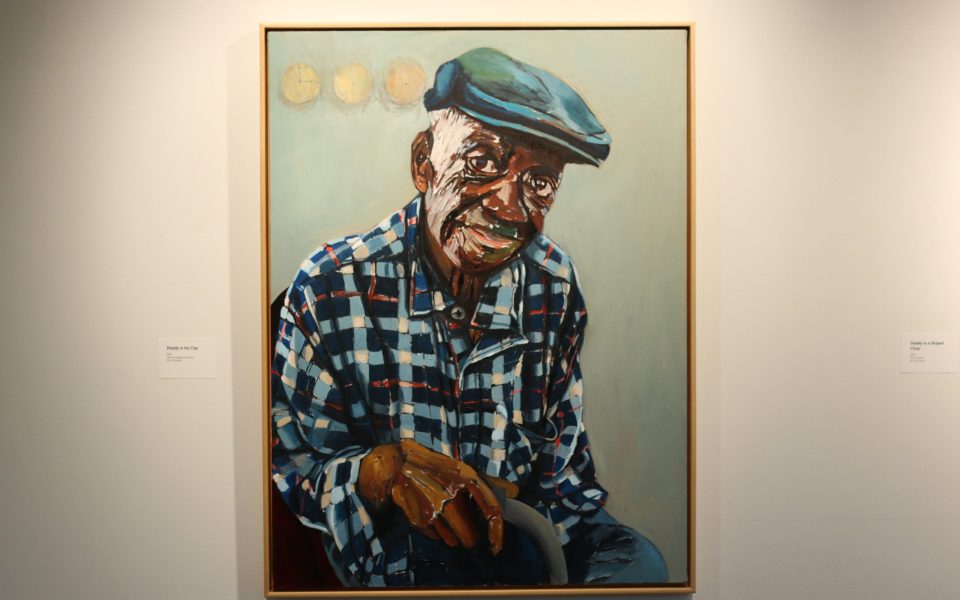Sherri Peterson put it simply: Certain paintings talk to each other.
Peterson, a gallery assistant at the Southeastern Center for Contemporary Art in Winston-Salem, pointed to three of Beverly McIver’s seven featured pieces.
“These three did that immediately,” she said, referring to “Daddy in his Cap,” “Daddy in a Striped Chair” and “Taxi Driver.” Each of the large paintings prominently features McIver’s biological father, Cardrew Davis, a retired cab driver living in Greensboro.
“You take them down,” Peterson concluded, “and the conversation ends.”
Beverly McIver’s seven paintings are the most recent edition to SECCA’s 12 x 12 artist salon series that presents 12 contemporary artists from across North Carolina, the nation’s 12th state.
The gallery stayed open late on Jan. 24, when SECCA hosted a screening of Raising Renee, an Emmy-nominated documentary film that tells the story of McIver and her promise to assume the care of her mentally disabled sister Renee after their mother dies.
Though the movie focuses on Renee, who sometimes proves to be a challenging part of Beverly McIver’s life, the paintings all depict Beverly’s relationship to and perception of men, a separate challenge that’s also addressed in the documentary.
Sherri Peterson’s analysis came from an abstract perception of artistic aesthetic, though it’s hard to disagree with her conclusion. The dialogue between the paintings functions through the unity in theme and artistry — McIver’s bold, broad lines and the warm, bright colors the works display — yet also through an acceptance, through the ability to find peace and beauty in something deeply challenging.
As told in the documentary, one day, when Beverly McIver was 17, an unfamiliar man appeared in her mother’s doorway. Her mother Ethel introduced him as Beverly’s father, a different man than the one listed on her birth certificate, who abandoned the family when Beverly was a child. Facing the man in the doorway, the young Beverly stood still, confused and silent.
Despite making the introduction, Ethel continued to distance herself from Cardrew Davis. It wasn’t until after her mother’s death many years later that Beverly chose to reach out to her father.
[pullquote]Beverly McIver’s selection is on display at SECCA (750 Marguerite Dr., Winston-Salem) until to Feb. 12.[/pullquote]
In an artist statement for her larger body of work, Beverly McIver expresses, “My current work is about my relationship with Cardrew. I’m searching for who Cardrew is as a man, as a father, and even who he was as a youngster. Through painting, I hope to capture the many faces of my dad.”
Clearly, McIver achieves her goal of presenting her father through the paintings, but it’s the specific faces that McIver chose to capture that reveal her acceptance and ability to overcome.
“After years of not knowing what a father’s love felt like,” McIver’s statement says, “I now know.”
The artist’s recent paintings illustrate a closure that extends beyond the film’s depiction. McIver portrayed her father as content, even when he’s frail or vulnerable, even when he’s proud. The serenity seems to be an extension of McIver’s own relationship with her father, an emotion she allowed for the person on the canvas as well as herself behind it.
Curious of the sisters’ relationship to another man in their life — someone named Lonnie who not only is mentioned in the film but is a subject and title of one of Beverly McIver’s featured paintings — I asked Beverly’s sisters Renee and Roni who were present at SECCA after the film.
“He’s our favorite cousin and we’re crazy about him because we grew up with him,” Renee answered.
Her other sister Roni added, “That particular painting…. Lonnie had fallen so his face was all messed up like that. That’s why he looked so monstrous.”
Indeed, the painting of Lonnie depicts him with one eye shut: vulnerable, even hurt, though not unhappy, nor ugly. Again McIver contends with masculinity by expressing someone at once frail and, in Roni’s words, monstrous, though not in a negative or frightening light. Once again, it signifies a sense of peace in the artist as well as the subject.
Join the First Amendment Society, a membership that goes directly to funding TCB‘s newsroom.
We believe that reporting can save the world.
The TCB First Amendment Society recognizes the vital role of a free, unfettered press with a bundling of local experiences designed to build community, and unique engagements with our newsroom that will help you understand, and shape, local journalism’s critical role in uplifting the people in our cities.
All revenue goes directly into the newsroom as reporters’ salaries and freelance commissions.


Leave a Reply